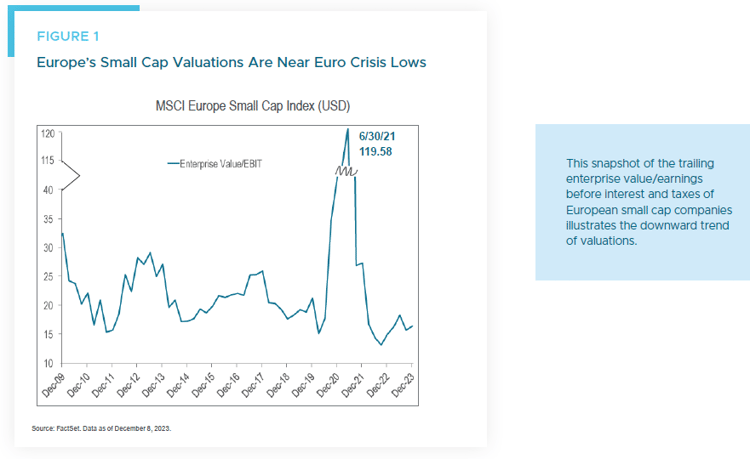Opportunities Among Challenges: Small Caps in Europe
Equity Portfolio Manager Karl Kyriss shares what he learned on his recent trip to Denmark, Sweden, and Norway, including why he feels the European Union (EU) might be home to some of the most attractive — and innovative — companies today.
Q: The EU economy has been suffering from the invasion of Ukraine, inflation, energy concerns, and higher interest rates. How have you seen these headwinds impact day-to-day operations at the companies you invest in?
Karl Kyriss: There’s no doubt there have been an unusual number of challenges facing companies in the EU over the past few years. However, we work to invest in companies that have inherently resilient business models. The companies in our portfolio are cash-generative businesses, trading at reasonable prices, with little to no debt. This enables them the flexibility to operate in volatile environments and outperform their peers.
Q: China trade friction seems to be crossing the Atlantic. Was this mentioned during any company meetings?
Karl: EU small cap companies have been quickly moving towards a “China for China” strategy. I started hearing about this approach 6 – 10 months after Russia invaded Ukraine. The “no limits partnership” established by Russia and China months before the invasion, coupled with China’s economic support of Russia since then, has caused companies to rethink their approach to the country. From what I’ve observed, it’s not less investment in China, but actually incrementally more investment domestically. From a long-term perspective, it appears that companies are preparing for a more conflicted global environment.
Q: Climate goals were dialed back in the UK. Is there concern across the continent that these goals are unattainable, or could hurt their economies and businesses?
Karl: One of Prime Minister Sunak’s contentious decisions was to delay the ban on the sale of new diesel and internal combustion engine automobiles from 2030 to 2035. Car manufacturers have invested in electric vehicle manufacturing based on the UK government’s original plan to ban the sale of new petrol and diesel cars from 2030. While I did not hear much from the companies I met with specifically regarding autos, there was a decent amount of discussion regarding the need for consistency on climate-related regulations.
Q: What’s the most encouraging thing you’re seeing in Europe, from a market or investing perspective?
Karl: Valuations have come down quite substantially in Europe. We haven’t seen price multiples this low since our Strategy was launched in 2014 (Figure 1).

Q: What’s the most discouraging thing you’re seeing in the EU? What are the biggest challenges there now?
Karl: The region is facing several challenges: Land war in Continental Europe, interest rates not seen since the early 2000s, trade friction, supply chain disruptions, you name it! But the positive I take out of this is that companies have managed through these events, continue to operate profitably, and are executing on long-term goals. That is a key measure of business quality and management skill.
Q: Are businesses embracing change and staying competitive?
Karl: Companies that operate in the EU understand the importance of staying competitive. Regional growth is not as dynamic as what we observe here in the US, and that has been the reality on the ground for a very long time. With an aging population, European companies must be exceedingly careful when allocating capital. But low relative economic growth does not mean a shortage of investment opportunities. There are numerous highly profitable small cap companies in the EU, and many have been operating successfully for decades.
Q: Are there any notable advances in technology, health care, or other industries?
Karl: The Nordics are among the most innovative countries in the EU. Using one area where we are invested as an example, their electronics manufacturing services industry is a critical partner and supplier to leading defense, aerospace, medical technology, and renewable energy companies. They continue to secure new design and manufacturing contracts for complex components across these industries.
Published December 2023
